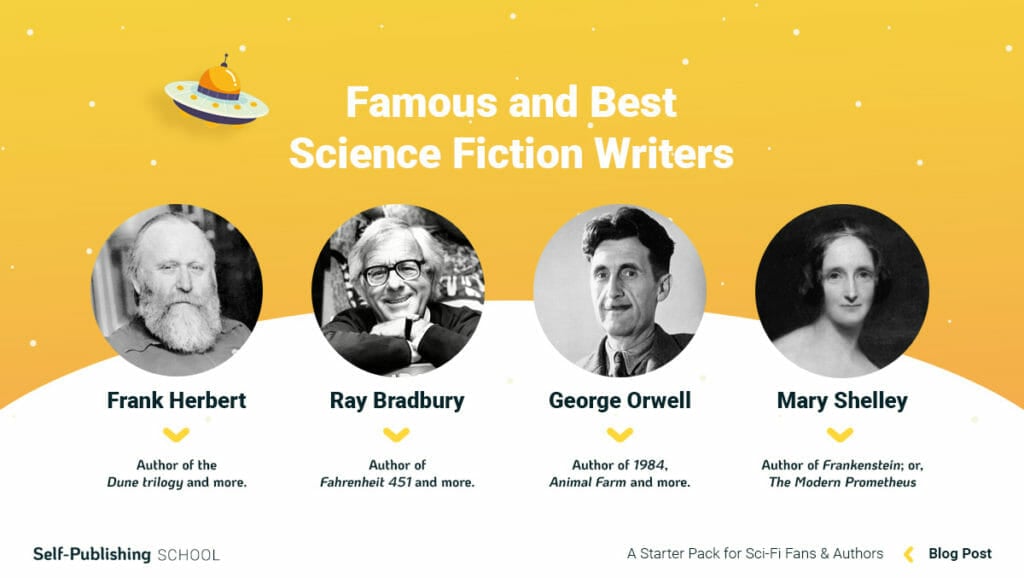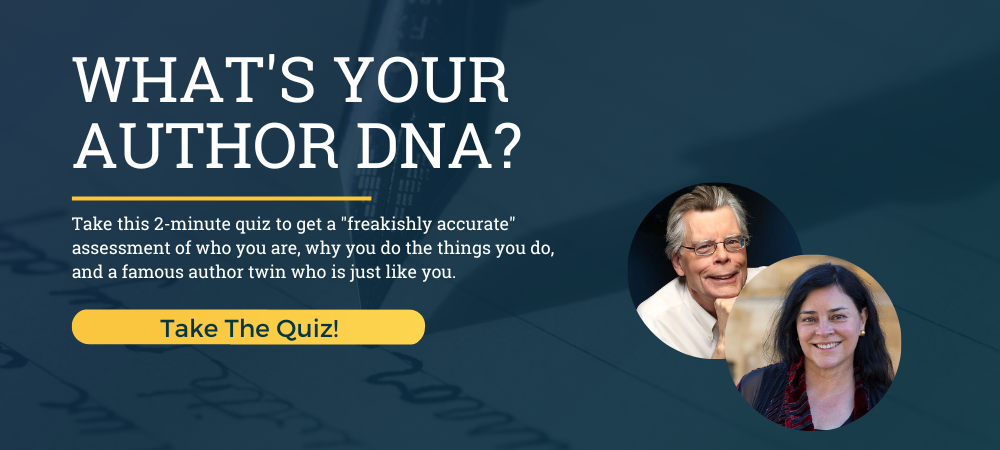Science fiction is awesome!
For those of you who don’t know: sci-fi is a genre that focuses on far-off, imagined concepts, usually with an emphasis on futuristic technology. Sci-fi fans and authors agree, it’s a genre of speculative fiction, and it’s long been one of the most popular genres used by authors to explore wild possibilities about our planet—-and other planets, too.
Sci-fi fans and Authors
If you’re new to sci-fi, or if you’re a fan looking to explore your interests, we’ve compiled a resource for you here. We’ll touch on some sci-fi authors to check out if you’re new to the genre, touch on some tips for writing science fiction, and even give you some sci-fi prompts to get you started!
Without further ado, here’s a starter pack for sci-fi fans and authors.
Who To Know: Famous and Best Science Fiction Writers
If you’re a writer, it’s super important to read in your genre, regardless of what you write. And if write science fiction, you’re probably a fan of science fiction—-I hope—-so you might be interested in exploring some new stories anyway! The most flattering action is to the connection to Sci-fi fans and authors. We all learn first and act afterwards. This beautiful genre is no different.
Here’s a breakdown of some of the most well-known sci-fi to get you started, as well as some titles to try out with your sci-fi book club:
Frank Herbert
Frank Herbert is the author of Dune, which was originally published as a set of serial pieces in Analog magazine back in 1965. It has since been published as a book, and it’s won a ton of critical acclaim!
This book is largely considered to be one of the best examples of sci-fi out there. It’s got dense, lush worldbuilding, which makes some people a little scared to get into it. But if you haven’t tried it, give it a look, especially if you’re interested in a masterclass in worldbuilding!
Ray Bradbury
If you’re a fan of dystopian fiction or speculative fiction rooted heavily in current-day issues, Bradbury’s your guy. You may have read Fahrenheit 451, a novel about a dystopian future in which the government has banned all books, in school. But if that one doesn’t strike your fancy, he’s got plenty of other hits to choose from!
George Orwell
Orwell’s another sci-fi dystopian powerhouse. His novels 1984 and Animal Farm have long been used to explore the effects of capitalism on our society (and to torture children in English III). If you had to read his books in school and hated them, I strongly encourage you to give them another try—-his books take a nuanced, detailed approach to a potential dystopian future, and although he wrote them in the 1940’s, they hold up surprisingly well.
Frankenstein by Mary Shelley
When she wrote Frankenstein, Mary Shelley single-handedly invented the sci-fi genre—-no joke! Frankenstein is largely considered to be the foundational science fiction text. It hits all the genre touchstones—-science gone too far, a pondering on what technology should be capable of, and what it means to be human.
That’s a good start into the sci-fi hall of fame. Now that you’ve got a reading list, let’s go over some pointers for writing a sci-fi novel of your own!
Writing Science Fiction

First things first, we need to make sure we’re on the same page. You may notice that sci-fi and fantasy are often all shelved under ‘sci-fi’ at your local library or bookshop. That’s because the terms are sometimes used interchangeably, and both fall under the ‘speculative’ umbrella.
We’re talking here about what you think about when you think about sci-fi—-a focus on tech, outer space, that kind of thing. Honestly, a lot of it comes down to genre conventions and tropes. You know high fantasy when you see it. Star Wars might technically be a fantasy story, but it’s probably the first thing that comes to mind when you think of sci-fi.
That being said, these tips are for sci-fi as we think of it, but they’ll probably help you out with fantasy, too.
Hard vs Soft Sci Fi
When you’re getting started, it’s important to make sure you know what you’re writing. The best way to do this is to read and figure out what sort of stuff you prefer to read! Here are a few terms to help you narrow down your scope of focus.
“Hard” sci-fi is technical. It’s focused on scientific accuracy. In a hard sci-fi novel, everything in it should be plausible. It doesn’t have to have happened or already exist—-remember, sci-fi is about an imagined alternate world—-but the science needs to check out.
A great contemporary example of hard sci-fi is The Martian. It’s speculative (we haven’t landed a man on Mars at all, and the mission depicted in the book didn’t happen), but the science the main character uses to solve his problems and survive on Mars is real.
“Soft” sci-fi is looser. It’s generally closer to magic—-this is the sci-fi that technically should be classified as fantasy, but it’s still following sci-fi genre conventions and tropes. The Star Wars movies are a great example of soft sci-fi. We don’t know, scientifically, how lightsabers work (and no, the midichlorian explanation from the prequels does NOT count). We have the Force, too, which is functionally just a magic power. What makes it sci-fi is the setting, tropes, and overall feel.
Find Your Subgenre
Okay, so hard and soft sci-fi helps, but we still have a billion subgenres to reckon with. Where does your story fit?
Sci-fi encompasses a huge variety of genres, especially when you consider that much of what we consider fantasy technically is also science fiction, but I’ve got a list of subgenres to help you get a sense of what you might be interested in.
Alien Invasion
This one’s self-explanatory–alien invasion stories are about extraterrestrial life coming to Earth. E.T., Arrival, and 10 Cloverfield Lane are examples of alien invasion sci-fi.
Dying Earth
Dying Earth encompasses all those feel-good stories about, you know, the end of Earth. This could be an ecological collapse or an implosion of the planet itself, but the general idea is that the stories concern the apocalypse from a scientific, plausible perspective.
Science Fantasy
This one’s a little tricky to nail down. In science fantasy, the world might take some creative liberties when it comes to science and borrow heavily from fantasy, but still contain scientific explanations and sci-fi tropes.
Star Trek and Star Wars are some examples of science fantasy, but it’s important to note that there’s no hard definition for this subgenre—-it’s kind of a catch-all for that in-between fantasy and sci-fi stuff.
Social Science Fiction
Social sci-fi focuses more on contemporary social issues. The Handmaid’s Tale by Margaret Atwood is a useful example, as it uses the imaginative lens of science fiction to explore women’s rights issues. This kind of fiction is generally less interested in the specifics of tech and science and more interested in sociological, historical, and political stuff.
Space Opera
Because of Star Wars and Star Trek absolutely dominating the sci-fi landscape for so long, most people think of space opera when they think of sci-fi. Space opera involves space warfare! This is all of the intergalactic stuff, and genre touchstones include chivalric romance and dramatic adventures.
Alright! You’ve got your subgenre, you know what sort of sci-fi you want to write. But there’s still one more tool we can put in your arsenal to help you write your next sci-fi novel.
Nail Your Premise
Since sci-fi is speculative in nature, the most important part of it is that initial question: What if?
The premise of your story is that “what if” question. It’s the thing about which you’re speculating in the story. What if a meteorological disaster caused the end of the world? What if the surveillance state grew to encompass every part of our lives?
You want your premise to be interesting and full of possibilities. Once you’ve got a solid “what-if,” here are some things to ask yourself:
How did this happen?
What happens next? (This will be the plot of your book.)
Who could solve this problem? (These will probably be your main characters!)
What are the challenges in solving this problem? (This is your conflict.)
These questions are helpful when writing any type of book, since all fiction is speculative to some extent. But they’re especially helpful in sci-fi, where it’s important to make sure you’re keeping things more or less scientific and mapping out actions to their logical conclusions.
Science Fiction Writing Prompts
Last, but certainly not least, we’ve compiled a few science-fiction writing prompts to help you brainstorm your next sci-fi adventure. These range from sillier to more serious, depending on your preference, and we’ve included a few different subgenres to spark your imagination. Feel free to use these as a jumping-off point for your own ideas!
A horrible storm wipes out all electricity in the continental US.
During an intergalactic war, a drug smuggling pilot falls in love with the princess of a rival planet.
An alien makes contact over the radio with a group of college students out camping during spring break.
Extraterrestrial life invades a tiny town in the American Midwest.
All of Earth’s plants begin to communicate, and they decide to kill all humans.
Imagine a future in which the government has decided to make owning pets of any kind illegal. Why did they decide this? What happens to transgressors?
With prompts, fundamental info, and some tips under your belt, you’re ready to start your sci-fi adventure!
Let us know what your favorite sci-fi novel is in the comments!
